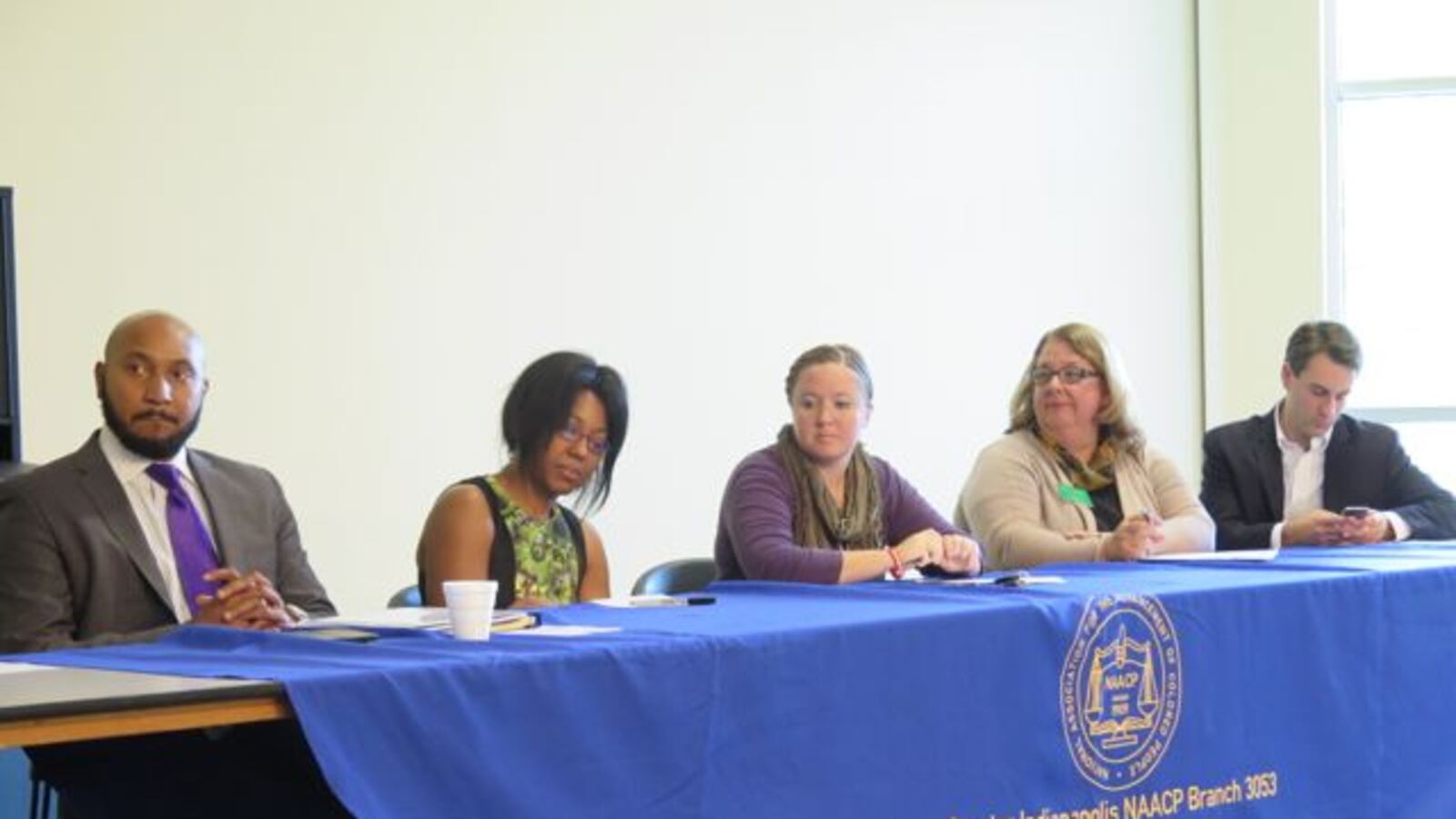Three candidates for IPS school board have already raised at least $15,000, suggesting this year’s race could rival 2012 as one of the most expensive in the district’s history.
For the crowded race this fall, with 10 candidates seeking three seats, the Greater Indianapolis NAACP, Concerned Clergy of Indianapolis and a union for state and city workers jointly hosted a candidate forum today at Martin University. Nine of the 10 candidates attended the forum, moderated by WTLC radio host Amos Brown, including the three incumbent candidates: Annie Roof, Michael Brown and Samantha Adair-White.
Roof is opposed by former State Rep Mary Ann Sullivan, Light of the World Church Pastor David Hampton, Butler University professor Josh Owens, and former IPS employee Ramon Batts. Adair-White is being challenged by former school board member Kelly Bentley and another former IPS worker, James Turner.
LaNier Echols, a charter school administrator who is running against Brown in District 5, could not attend.
On some of the key issues discussed at the NAACP’s forum, here is where the candidates said they stand:
Money floods in for some candidates
Moderator Amos Brown asked all the candidates to reveal how much money they had raised. Here’s what they said:
- At-large race: Sullivan has a large fundraising lead of the five at-large candidates with about $30,000. Hampton said he’s raised $15,000, Roof has $3,500, Owens has raised $2,500 and Batts said he has $525.
- District 3: Bentley said she has about $30,000, Adair-White said she has about $1,500 and Turner said he hasn’t raised any money yet.
- District 5: Michael Brown said he has $260 raised so far. His opponent, Echols, was not in attendance.
In 2012, three successful candidates all raised at least $50,000 running for the board, sums that were unheard of in past races.
Should IPS partner with charter schools?
Roof said a new law encouraging IPS to partner with charter schools “scares me a bit.” Passed earlier this year, it allows the district to hire charter school groups to run district schools or turn its buildings over to become charter schools.
While Roof is wary, she said she wants to partner with groups to help schools that have long struggled if such a deal works for both sides.
“I don’t want to give away our schools,” she said.
Sullivan was one of the few Democrats who supported the bill in the legislature. She said charters can be effective partners for IPS rather than the profiteers they are sometimes depicted to be.
“There’s a lot of misunderstanding about what this legislation does,” she said. “There’s a lot of paranoia. The vast majority of (charter groups) are non-for-profit.”
Owens said he was “probably the strongest supporter (of the charter school law) of everyone here.” The partnerships will create solutions for neighborhood schools by giving them more flexibility, he said.
Adair-White said she is adamantly opposed to the law.
“You would not believe how many companies have contacted our superintendent to get one of those schools started,” she said. “Our kids are not for sale. It is a disgraceful attack. I don’t like it and I’m not with it.”
Bentley said she would favor any partnership to help kids improve, including charter school partnerships.
“If we care about kids, we need to get beyond the name-calling and beyond the conspiracy theories,” she said.
Top priorities: Graduation, parents and building on success
Hampton said raising graduation rates without awarding waivers, which exempt graduates from the requirement to pass state tests, was his top priority. Students can’t be prepared for college and life if they can’t pass state tests, he said.
“Are our children failing in a system or is the system failing our children?” Hampton said.
Brown said other schools can repeat the success of top-rated neighborhood schools, like School 90 and 109.
“There’s no new thing in education,” Brown said. “If you really want to improve, you have to replicate programs that are successful.”
Turner said the district needs to focus inward to improve rather than look for external partners.
“We’re going to strengthen other schools on the backs of IPS,” Turner said.
Ramon Batts, said parent engagement is missing from many schools.
“In elementary schools, you see parents everywhere,” Batts said. “By high school, it’s over. We need to build those relationships so they’re not angry. The only time we reach out is when we kick their child out of school.”
See More: Here are the six critical questions the IPS school board race will answer.
CORRECTION: Ramon Batts was incorrectly identified in an earlier version of this story.

